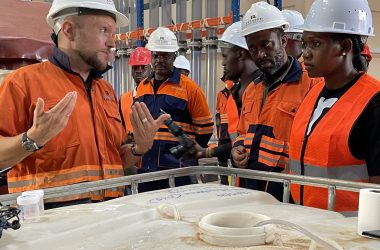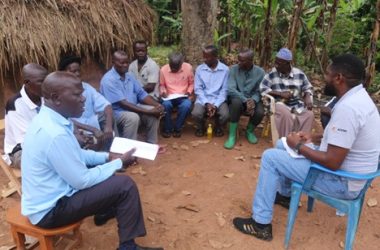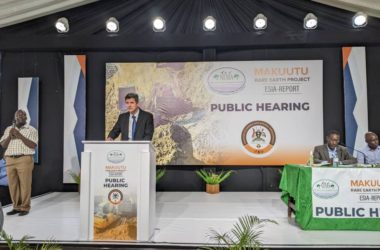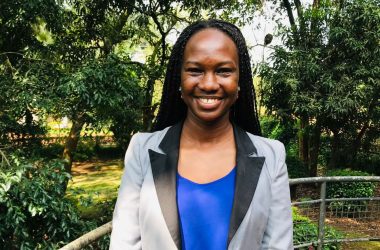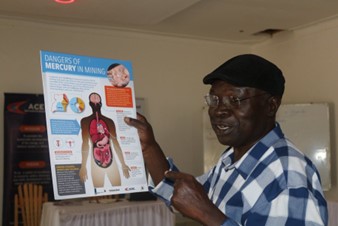In 2019, Artisanal and Small scale Miners (ASMs) in Buhweju District were stopped from mining by the Police Minerals Protection Unit because they did not have the requisite mineral rights. The miners contested the decision, but went on to apply for mining rights over their mining areas. They were recently granted an Exploration License area. Pearl Arigye spoke to Deusdedit Beinomugisha, the Chairman of the Buhweju Small scale Miners Association on this development.
How was the journey leading up to acquiring the licence?
The struggle to acquire the exploration licence has been long. It started in 2017 and was actually coming to three years before the licence was awarded. The journey started with the disagreement between the ASMs in Buhweju and the Chinese company, Hubei Jiu Zhou Geological Exploration Company Ltd. The company had sued the ASMs accusing them of mining illegally under their licence and wanted compensation for revenues they said were lost to the ASMs.
The ASMs however had been mining and getting income in that area for years, although informally, before the company applied for a licence.
The miners had initially attempted to apply for the licence as the Buhweju Small Scale Miners Association which they had formally registered as a company limited by shares. During this same time, Hubei had applied for 88.9 Sq.Km while the Association applied for 20 Sq.Km in the same area.
Hubei was awarded the license they had applied for which also covered the 20 Sq.Km that the ASMs had applied for. When the ASMs were not awarded the licence, they were forced to go to
Parliament and speak to
the Committee on Natural
Resources presenting their
case. This led to a visit
by the Committee to the
Buhweju gold mines. The
ASMs later requested for
and sat on a round table
with officials from the
Ministry of Energy and
Mineral Development as
well as members of the
Committee. It was in this
meeting that the Ministry
advised that the miners
register their association as
a cooperative and reapply.
The officials did agree that
since the people of Buhweju had been mining in that area for years, they deserve a licence over part of the area, as long as it was done in a legal manner and their mining operations formalized. This is part of the initiative for the Ministry to gazette areas for ASM activities.
The miners followed the Ministry’s advice, registered the Cooperative and applied for the Exploration Licence. The Exploration Licence was finally awarded to the Buhweju District United Miners Cooperative Society Ltd in November 2020.
Are there different partners under the licence?
The licence holder is the Buhweju District United Miners Cooperative Society Ltd and it is the Cooperative that will inject monies into the mining operations for now. There are no other partners or investors that we have talked to or that are working with us under the licence.
How big is the licence and what areas does it cover?
The licence is 35 Sq.Km and covers parts of Kajjani Town Council, Nyakazooba Town Council, Engaju, Nyakishana and Biyanga. All these are areas in which the ASMs already had their gold mining operations.
What do the ASMs hope to achieve with the licence?
The licence gives the ASMs the opportunity to work without fear of being evicted
which is what had happened before and this will help with job creation and earning of income for the different ASMs under the Cooperative. Right now, the Cooperative is still registering members, and trying to increase membership to involve all ASMs in Buhweju. The projection made is that at the end of the day, members will be about 20,000 people.
Mining directly benefits about 40% and indirectly benefits about 80% of the population in Buhweju. This licence will ensure that this continues and mining continues to be a source of income to many households in the district.
How will the cooperative manage the statutory requirements that come along with holding a licence?
The Cooperative is in the process of developing a policy on how they will manage the licence, work within the terms and ensure that they are paying any of the necessary taxes. Because the area has been gazetted for ASMs, the Cooperative also plans to consult with the Directorate of Geological Survey and Mines (DGSM) and have further talks which they hope will lead to them applying for a Mining Lease over the area which will run for 35 years.
This will keep providing
people with income for many
more years and because the
gold in Buhweju is believed
to be a lot, it can be mined for years and years. Currently the Cooperative is working to explore the licenced area and find the specific areas that are richest in gold which they intend to lock down with a mining lease.
Do you think being formalized and licenced will make it easier for the Cooperative to get access to finances?
Because they are now legalized and licenced, the ASMs believe it will be easier to access finances. The Cooperative’s plan is to approach both government and non- governmental organizations with the aim for them to avail the group with finances but are mainly and more importantly looking for machinery which will support their work and increase their production. This plan will also be inserted into the Cooperative’s policy so as to ensure that it is followed and to make it more official and formal.
It was confirmed that the group had never tried to get financial aid because they just did not think they would be able to get it. The group used their earnings to invest back into their work. However, this new status makes them more hopeful and they think it will make it easier to approach different institutions with their plans and request financial aid or aid in terms of capital.
What advice do you have for other ASMs that are still operating informally?
The miners in Buhweju had been mining for many years without a licence until we were disorganized by a company that had got its own licence in that same area. We were told to stop mining because we were illegal and people lost jobs and money. I encourage ASMs to form associations, register them and mine legally.
The government now realizes the potential of artisanal and small scale mining and this has opened doors for us. There are more opportunities in the sector, government is gazetting areas for ASMs and we can now apply for licences and also start contributing to ourselves as well as the economy. It will benefit both us and the country if ASMs can all be formalized.


